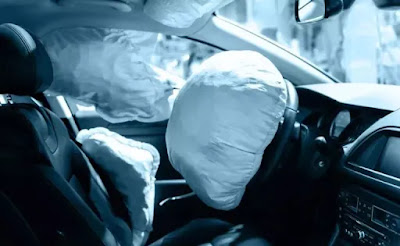Filenews 11 July 2025 - by Angelos Nikolaou
One of the most discussed findings of recent years, that of the Investigative Committee on the case of the defective Takata airbags, is handed over today to the Attorney General of the Republic, George Savvidis. The handover will take place at a press conference at the offices of the Legal Service where the Attorney General and the Chairman of the Investigative Committee will make statements on the investigation of the disposal of vehicles from the EU, the import of vehicles from third countries into the Cypriot market and the recall of these vehicles.
The finding, the product of a four-month investigation by the three-member Committee under Michalakis Christodoulou, clearly documents serious weaknesses, omissions and possible negligence related to the chain of recall and management of dangerous vehicles in the Cypriot market. According to authoritative sources, both disciplinary and criminal responsibilities arise for competent state services and officials who have served in key positions. Essentially, through the report and the data recorded in it, they lead to the need for a criminal investigation for a specific executive who served as a director.
The Attorney General himself has stated that the Legal Service will thoroughly study the content of the report and, in cooperation with the Commissioner for Personal Data Protection, will proceed with its publication, after the personal data included have been processed. "They will hand over the report to me in its entirety. We will study it, and if there are responsibilities - as I believe - they will be attributed. We will do the obvious," Mr. Savvidis said.
The investigation focused mainly on three serious incidents, two of which were fatal, involving explosions of Takata airbags in traffic vehicles in Cyprus. Particular emphasis was given to the circular of the Department of Road Transport (TOM) dated 21 March 2017, which, according to the Commission's findings, left a gap in information and responsibilities, exempting importers from the obligation to provide information on the recalls of "grey" vehicles. A common finding is that the 2017 circular was the beginning of the problems in the recalls of hundreds of thousands of imported vehicles.
Through dozens of testimonies, long-standing institutional dysfunctions, coordination deficits between services and lack of information to political superiors were revealed, resulting in dangerous vehicles remaining on Cypriot roads for years until today, without notifying their owners.
The final conclusion is not limited only to findings, but proceeds to the division of responsibilities and suggestions for further investigation. At the same time, gaps are identified in the existing legislation and proposals and suggestions are made to supplement them, but also for better transparency.
In the event that criminal offences are found, including by the Attorney General, the file will be forwarded to the Police for due diligence. At the same time, where disciplinary offences are detected, the competent administrative authorities will be informed for the imposition of sanctions or the taking of corrective measures.
The shocking outcome of the cases examined, with the death of Styliani Giorgalli, Kyriakos Oxynos and the serious injury of Alexandros Lougos, is depicted as a timeless failure of the state to protect its citizens.
The President of the Commission, at the last session, made a public apology to the families of the victims. There was no shortage of emotion, but as the relatives stated, the "apology must be accompanied by actions and the attribution of responsibility".
The conclusion is characterized by informed sources as a catapult, putting the Legal Service before crucial decisions.
Its release in the coming days, once the personal data has been secured, is expected to spark public debate and potentially bring about institutional reforms in the field of road safety, consumer information and recall management.
During the hearings before the Commission, it was mentioned that there had been exchanges of emails since 2011 on vehicle recalls. Further, it emerged that there was a dispute between distributors and importers which caused further problems in the management of recalls. It was also found that the measures in force and still exist do not ensure the chain of information for owners of imported vehicles.
